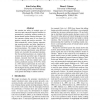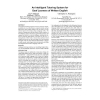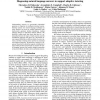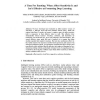33 search results - page 3 / 7 » Adapting to Student Uncertainty Improves Tutoring Dialogues |
103
click to vote
ACL
2004
15 years 3 months ago
2004
We examine the utility of speech and lexical features for predicting student emotions in computerhuman spoken tutoring dialogues. We first annotate student turns for negative, neu...
126
click to vote
NAACL
2004
15 years 3 months ago
2004
We examine the utility of multiple types of turn-level and contextual linguistic features for automatically predicting student emotions in human-human spoken tutoring dialogues. W...
108
click to vote
ASSETS
2000
ACM
15 years 6 months ago
2000
ACM
This paper describes progress toward a prototype implementation of a tool which aims to improve literacy in deaf high school and college students who are native (or near native) s...
111
click to vote
FLAIRS
2008
15 years 4 months ago
2008
Understanding answers to open-ended explanation questions is important in intelligent tutoring systems. Existing systems use natural language techniques in essay analysis, but rev...
103
click to vote
ITS
2010
Springer
15 years 3 months ago
2010
Springer
We have developed and evaluated an affect-sensitive version of AutoTutor, a dialogue based ITS that simulates human tutors. While the original AutoTutor is sensitive to learners’...




